- Home
- Isaac Hooke
Clandestine-IsaacHooke-FreeFollowup Page 5
Clandestine-IsaacHooke-FreeFollowup Read online
Page 5
Aaron shrugged. "I passed the account Sam's way first, and she confirmed it wasn't NSA. But as I was saying, I messaged the dude and asked how we could join our brothers, and he returned the phone numbers of three local smugglers. So I called one and set us up. By the way, we're not supposed to dress too traditionally during the crossing. We draw less attention that way."
"What about weapons?" Ethan said, glancing at Aaron's backpack.
"Not allowed."
"What do you mean? Not even pistols?"
"We won't get through if we bring weapons of any kind," Aaron said. "According to the recruiter, IS will provide assault rifles anyway."
"Assault rifles?" William asked suspiciously. "What kind of assault rifles?"
"AK-47s."
William threw up his hands. "I'm so sick of those damn things. I've never fired a more inaccurate rifle in my life. I'll take an M16 any day of the week over an AK."
Aaron shrugged. "Hey, we're clandestine operatives now, not the pampered spec-ops soldiers we once were." He returned Ethan's Android.
"You never know how good you have it until you give it up," William bemoaned.
Ethan unlocked the phone, navigated to Apps, and swiped to the last screen. He saw the green, flamelike icon for Amn al-Mujahid but nothing else. The icons for the other new apps would be hidden, he knew.
Aaron showed him how to use the hidden apps.
"That leaves only one more question," Ethan said when they were done. He snatched the greasy bag from the table but it proved empty. "When do we get more baklavas?"
seven
Aaron called the people smuggler shortly thereafter and arranged for transport early the next morning. Ethan spent the rest of that day exploring Gaziantep and eating the baklavas and pistachios the city was famous for. He slept well that night, the last good rest he would have for quite a while, and at five a.m. checked out.
Like him, the other operatives were dressed in a T-shirt and jeans, with their keffiyehs stowed away. For Ethan, it was odd removing the headgear after all that time, and he felt almost naked without it. But the goal was to look like an ordinary Syrian or Turk at the border crossing, so the keffiyeh had to go.
It was still dark out when a brand new supermini Renault Clio pulled into the loading area.
"That's our ride," Aaron said.
"Apparently smuggling pays off," William said.
"If you knew how much I paid the man," Aaron grinned. "You'd quickly realize we were in the wrong business."
A Turk got out, introducing himself as Maaz. He opened the Renault's rear hatch and the three of them stowed their backpacks inside.
"Take these." Maaz distributed three travel documents.
Ethan accepted his. It was a Syrian passport. He opened to the photo page. The same picture he had on his Saudi passport was on it, though the keffiyeh had been edited out.
"Come here." Ethan angrily led Aaron away from the others. When he was out of earshot, he said, "You gave this man my photo?"
Aaron shrugged. "He needed it to make the passports."
"I don't want my picture in some terrorist computer network."
Aaron shook his head. "These smugglers are disorganized as hell. Your picture won't be showing up on any terrorist networks anytime soon, trust me."
Ethan was about to argue his point, but he let it go. Aaron was probably right.
"Besides, he's just a people smuggler," Aaron continued. "Only loosely related to the Islamic State."
"Yeah? Bet he's on the White House kill list somewhere."
"Probably."
Ethan returned to the vehicle and sat in the cramped passenger seat, nearly banging his head on the upper frame of the door in the process. William and Aaron took the backseats and the journey south began.
"Where are you from?" Maaz said in a colloquial, difficult to understand Arabic.
"Saudi Arabia," Ethan answered.
Maaz nodded. "You will love it in Shaam."
"You live there?" Ethan said.
The smuggler chuckled. "No. My calling is here, in Turkey. To help men like you make their hegira. I am too old for the Caliphate."
"You can't be more than forty," Ethan said.
"My point exactly. They need young men. Men who can fight. All the administrative positions are already filled." He glanced at Ethan askance. "You are twenty-nine? Thirty?"
"Twenty-eight," Ethan lied.
"A good age." Maaz drove on in silence. A moment later: "You have brought weapons?"
Ethan shook his head. "We were told not too."
"Good. You will be given weapons in the Caliphate. Along with room and board. And a salary, of course."
"What about wives?" Aaron said hopefully. From his tone, Ethan thought he was only half joking.
"Oh yes, if that is what you want, you will all get wives." Features brightening, Maaz glanced at Aaron in the rearview mirror. "Beautiful wives. There are plenty of women to be had. Dawlah will provide." That mean the State.
"Foreign wives?" Aaron said.
Maaz pressed his lips together. "Perhaps. There are many foreign women in the Caliphate. I have smuggled women from Pakistan. Afghanistan. France and Britain even."
The sun rose, and soon the streets of Gaziantep were behind them, replaced by pistachio farms. The verdure gave way to the dry steppe where only the occasional bushes clung to life amid the bedrock. Once in a while a decrepit village passed into view: rusting machinery, concrete houses clustered around a small mosque, grubby, half-naked children.
A Turkish checkpoint blocked the highway shortly, but the police officer waved them through. According to Maaz the police were stopping only pickup trucks and semis that day. Looking for oil smugglers who fed the Islamic State war machine.
In forty-five minutes they reached the city of Kilis, close to the Turkey-Syria border. In another ten minutes they were at the Oncupinar border gate, a steel trellis supporting an arched metal canopy over the highway. Flanking it, barbed wire fencing spanned the border from horizon to horizon.
Maaz bribed the Turkish gendarmerie border guard with the equivalent of ten US dollars and they were on their way. On the Syrian side they were stopped almost immediately by armed men standing in front of an old eight-wheeled Soviet BTR-60 armored personnel carrier.
"Free Syrian Army checkpoint," Maaz said underbreath.
One of the guards approached the driver-side door. He carried an RPD light machine gun slung over one shoulder.
Maaz rolled down the window.
"Passports?" the guard said.
Maaz collected the Syrian passports and handed them to the guard, who opened the documents to the photo pages in turn, checking that the faces matched.
"Do you have any weapons?" the guard said.
Maaz shook his head.
The guarded leaned forward, as if scanning the area between seats for hidden arms, then he surveyed the occupants once more. "Where are you going?"
"Family," Maaz said. "Aleppo."
The guard handed the passports back to the driver, then furrowed his brow. "Haven't I seen you before?"
Maaz shrugged. "It's possible. I have a big family."
The guard hesitated and then finally waved them on.
Maaz drove through. Glancing in the rear-view mirror, he laughed softly. "Idiots," he said smugly. "I've seen that one at least five times. Others even more often. They always let me pass."
Maaz drove for about ten minutes and then veered onto an unmarked dirt road, heading east. Fifteen minutes later he turned south onto another paved highway and floored the accelerator.
"Must be quick here," Maaz said. "In case they're following!"
Ethan glanced in the passenger side mirror but didn't see any pursuers.
The highway there, unlike the Turkish side, had plenty of potholes, and the Clio hit several of them along the way, jolting Ethan. He banged his head on the low ceiling every time.
"Can we slow down, please," Wiliam said from the backseat.
/>
Finally Maaz eased off the accelerator. There were still a lot of potholes, but at least the Turk had a better chance of avoiding them.
Ten minutes later Maaz reached another checkpoint: a mangled iron fence had been strewn across the road, with a Hyundai pickup parked in the lane beside it. The vehicle was a technical—a double-barreled ZU-2 was bolted to the truck bed. The black standard of the Islamic State waved beside the anti-aircraft gun.
Two AK-47-toting mujahadeen in balaclavas manned the checkpoint; the closest militant approached the driver side.
Maaz lowered the window.
"Salaam, my brothers," the mujahid said, ignoring the driver to address Ethan. "You have come to join Dawlah?"
Ethan leaned forward. "We have."
The militant removed his mask. He was a teenager, maybe eighteen or nineteen years old, with a downy, cropped jihadist beard. "Welcome, my brothers. Welcome! You have made it!"
eight
About an hour later Ethan found himself sitting beside Aaron and William in the bed of a different pickup truck, headed southeast along the dry steppe. The highway proved just as poorly maintained as the area near the border, and Ethan was jolted by a pothole every ten seconds or so.
He had retrieved the red and white-patterned keffiyeh from his gear and was wearing it, though he was still dressed in a casual T-shirt and jeans. Twice he checked his phone for a cellular network during the ride, but never found a signal.
The pickup stopped on the outskirts of a Syrian village. Two twenty-year-olds with AKM rifles greeted the teenaged driver. Ethan hopped down from the truck bed only to find himself the prompt recipient of a hug.
"Salaam!" the militant who embraced him said. "I am so glad you have made your hegira! Come, I will take you to the emir. I am Abdul. What are your names?"
"I am Emad Al'Saudi," Ethan said. Translated, that literally meant Emad the Saudi. It wasn't uncommon for foreign fighters to use an alias for their last names, especially one related to their country of origin.
William introduced himself as Wafeeq Al'Saudi and Aaron as Aadil Al'Yemeni.
"Most of our trainers are Saudis and Yemenis!" Abdul said excitedly. "You will fit right in."
Ethan wasn't sure whether that was good or bad.
Abdul threaded through the white-walled, flat-roofed houses, leading the way into the Islamic State border camp. Untilled wheat fields surrounded the concrete buildings of the former village; various structures had been erected in the withered pastures to support the training exercises. Large canvases patterned in digital desert camouflage had been raised over the more obvious constructions—when viewed from the air, those patterns would readily blend in with the dry yellow grass.
In a field nearby, recruits of all ages shot at plastic bottles filled with dyed water. Everyone wore fatigues: there was desert digital, desert plain, and forest digital. Probably American-made.
Abdul skirted the center of town, where some kind of urban combat exercise was taking place. Ethan spotted several armed recruits in fatigues and balaclavas, hunched outside a doorway. Two recruits ducked inside the concrete house at the same time, one going high, the other low. Another militant filmed the whole sequence on his cellphone, while two civilian children watched quietly from the second-floor balcony across the street.
Abdul led them to an obstacle course, where a group of recruits surmounted hurdles such as barbed wire, wooden logs, and climbing nets. It looked like a playground compared to the obstacle course Ethan had experienced in his own SEAL training. Patterned tarps camouflaged much of the course.
An instructor in a black turban was shouting encouragement at the recruits. Beside him a man maybe ten years older than Ethan watched with folded arms. He wore fatigues patterned in desert-digital, and his head was wrapped in the same red and white-checkered keffiyeh that Ethan wore. Acne scars pocked his lined face. He had an aura of command about him.
"Emir Haadi," Abdul said in respectful tones.
The pockmarked man looked over his shoulder questioningly.
"New recruits." Abdul nodded at Ethan and the other operatives.
Haadi broke into a fatherly grin. "Welcome home, brothers." His Rural Saudi accent was the Arabic equivalent of Appalachian English, so thick that Ethan barely understood it. "Come, let's get you processed."
The emir led them inside one of the low-slung concrete houses and sat behind a steel desk. He offered each of them bottled water.
"Your hegira went well?" Haadi said.
"As well as could be expected," Ethan answered, sipping his water.
"You are from Riyadh?"
Ethan nodded.
"I recognize the accent," Haadi said. "Tell me, how is the Euphrates River this time of year?"
Ethan frowned. "There is no Euphrates in Riyadh."
Haadi smiled. "No, there isn't."
"There is a lake, though," Ethan continued. "In Al Sallam Park."
Haadi's eyes became distant. "Ah, Al Sallam Park. It is beautiful this time of year." He abruptly pointed at their rucksacks. "Place your packs on the table, please."
The emir rummaged through their belongings: Qurans, duct tape, flashlights, batteries, matches. He paid no attention whatsoever to the USB sticks, instead homing in on their passports, which he set down on the table in front of him.
Haadi discovered the satellite hotspot and frowned. Ethan had elected to bring it along after all, in case the Islamic State was stupid enough to let them keep it.
"What is this?" Haadi said.
Ethan kept his cool. "Personal wifi."
"Laptop, okay. Phone, okay. This, not okay." The man set it aside.
Ethan glanced at Aaron, who shrugged in an I-told-you-so manner.
Next Haadi had them spread their legs, palms on the wall, and patted them down.
Haadi discovered their phones, which he didn't care about because there was no cellular network coverage. When he found the TruPulse 360s, he activated each device in turn and confirmed they were indeed range finders and nothing more. He also came across the lockpick kit Ethan had, and after a quick search through the picks and bump keys, he placed it alongside the other "allowed" items.
Finished his search, Haadi returned to his desk, flipped open a laptop, and typed up the information from the passports. With the built-in webcam, he snapped a photo of each of their faces. Ethan had gotten angry with Aaron earlier for sharing his photo with Maaz, but that was nothing: now Ethan's picture was stored in a terrorist database for real.
"Do you have a Dawlah tazkiyah?" Haadi asked. That meant a character reference from someone already part of the Islamic State.
Ethan shook his head. "We know no one here." Sam had hinted other embedded assets were already in play, but she was loath to reveal their identities, as was only right.
Haadi furrowed his brow. "As Saudis and Yemenis, I would have expected otherwise. There are many radical mosques that could have vouched for you. How did you get here?"
Aaron repeated the story about how he'd gotten in touch with a public Kik Messenger account associated with the Islamic State.
Haadi pressed his lips together. "So you didn't actually know your recruiter personally?"
"No."
"The route you took for hegira is more typical of Western holy warriors. And if you were Western fighters, I would be forced to run a security background check. We've caught their intelligence agents in our midst before. It won't happen again, not on my watch."
Ethan thought about what Sam had told him about choking off recruits by forcing the Islamic State to perform more thorough vetting. So it was already starting. Good.
Haadi tapped his lips. "But you're not Western fighters. So I will allow you to recite the pledge of bay'ah"—allegiance—"to the Islamic State. Raise your index fingers."
Ethan clenched his right hand and lifted his index finger, forming that oft-mimicked gesture posted online by Islamic State supporters. Most Westerners had no idea of the symbolism behind the act, but it al
luded to the belief that Allah was the only God, one of the five pillars of Islam and a component of the daily prayers. There is no God but Allah, Muhammad is the messenger of God. Those words, known as the Shahada, were written on the black standard of the Islamic State itself.
The gesture also symbolized the wielder's willingness to die for Islam, the one true faith, and reaffirmed the group's dedication to wiping out all other inferior ideologies. They wanted one God, one religion, one state. Worldwide.
"In the name of Allah the merciful we hereby swear allegiance," the emir said.
"In the name of Allah the merciful we hereby swear allegiance," Ethan and his companions repeated.
"To the Prince of the Faithful."
"To the Prince of the Faithful."
"And the Caliph of the Muslims."
"And the Caliph of the Muslims."
"Abu Bakr al-Qurashi." That was a name the leader of the Islamic State, Abu Bakr al-Baghdadi, used to claim descendance from the Prophet.
"Abu Bakr al-Qurashi."
"Allahu akbar!"
"Allahu akbar!"
Haadi returned their rucksacks and brought them to a supply house, where they picked out fatigues in their sizes, but did not put them on. Then he led them back toward the obstacle course.
On the way, he said, "I am the emir of the camp, but I also personally run the orientation brigade, which you are now a part of. All new recruits start with me until the class-up to war training. You are at a bit of a disadvantage, because you have arrived near the end of orientation, and after this Sunday, day of rest, you will be assigned to the war brigade. But, Allah willing, you will quickly adapt."
At the obstacle course, Haadi walked straight to a youth who had finished early and was waiting on the sidelines for the next round to begin.
"Ibrahim," the emir said.
A village boy just out of puberty, Ibrahim snapped to attention. He had the features of a Syrian. Probably conscripted from the locals.
"Assign them to quarters and get them changed," Haadi said. "Then bring them back."
"Any chance of breakfast?" Aaron asked hopefully.
"The life of the mujahid is austere," the emir said.

 Warden 2
Warden 2 Devastator
Devastator Warden 4
Warden 4 Emperor
Emperor Mech
Mech Conqueror
Conqueror Fighter
Fighter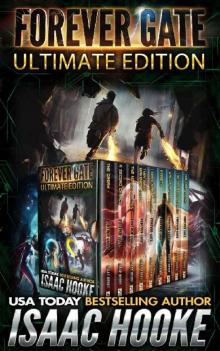 The Forever Gate Ultimate Edition
The Forever Gate Ultimate Edition Defiler
Defiler Mech 2
Mech 2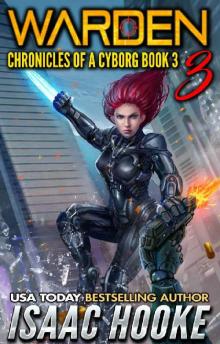 Warden 3
Warden 3 Warden 1
Warden 1 Mech 3
Mech 3 Forerunner
Forerunner The Alliance (AI Empire Book 2)
The Alliance (AI Empire Book 2) Breaker (Monster Tamer Book 1)
Breaker (Monster Tamer Book 1) Bender of Worlds
Bender of Worlds The Pendulum Swings (The Forever Gate Book 8)
The Pendulum Swings (The Forever Gate Book 8) The Link
The Link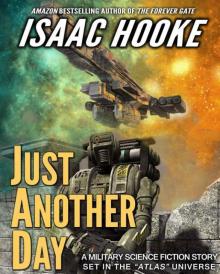 Just Another Day
Just Another Day Star Warrior
Star Warrior Alien War Trilogy 1: Hoplite
Alien War Trilogy 1: Hoplite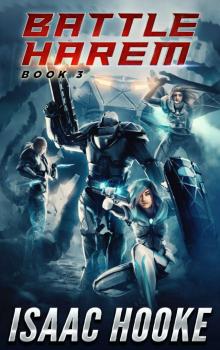 Battle Harem 3
Battle Harem 3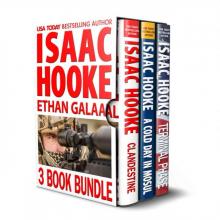 The Ethan Galaal Series: Books 1 - 3
The Ethan Galaal Series: Books 1 - 3 Reloaded
Reloaded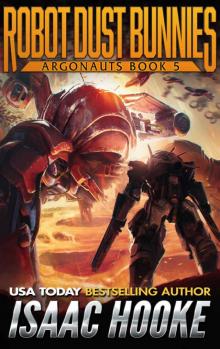 Robot Dust Bunnies (Argonauts Book 5)
Robot Dust Bunnies (Argonauts Book 5) Battle Harem
Battle Harem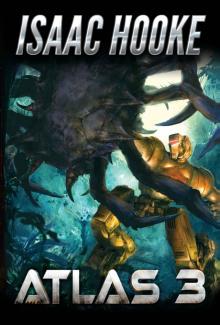 ATLAS 3 (ATLAS Series Book 3)
ATLAS 3 (ATLAS Series Book 3) Argonauts 2: You Are Prey
Argonauts 2: You Are Prey Worlds at War (A Captain's Crucible Book 5)
Worlds at War (A Captain's Crucible Book 5)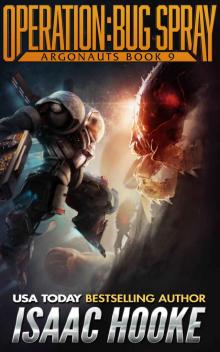 Operation: Bug Spray (Argonauts Book 9)
Operation: Bug Spray (Argonauts Book 9)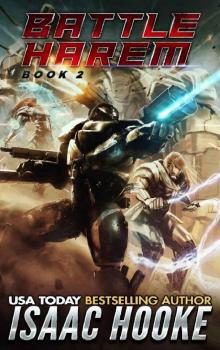 Battle Harem 2
Battle Harem 2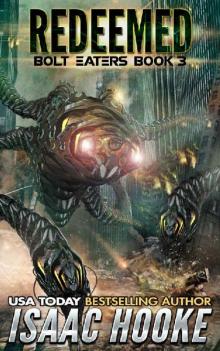 Redeemed (Bolt Eaters Trilogy Book 3)
Redeemed (Bolt Eaters Trilogy Book 3)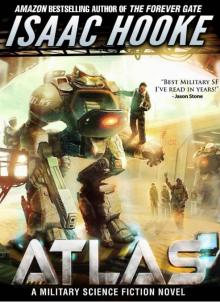 Atlas
Atlas Argonauts 1: Bug Hunt
Argonauts 1: Bug Hunt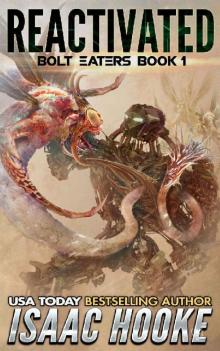 Reactivated (Bolt Eaters Trilogy Book 1)
Reactivated (Bolt Eaters Trilogy Book 1)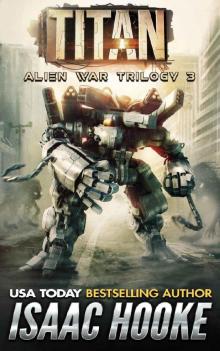 Alien War Trilogy 3: Titan
Alien War Trilogy 3: Titan Flagship (A Captain's Crucible #1)
Flagship (A Captain's Crucible #1)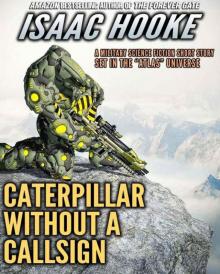 Caterpillar Without A Callsign
Caterpillar Without A Callsign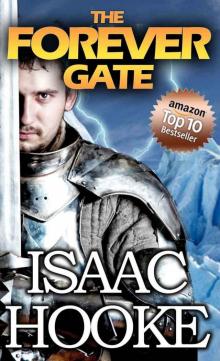 The Forever Gate
The Forever Gate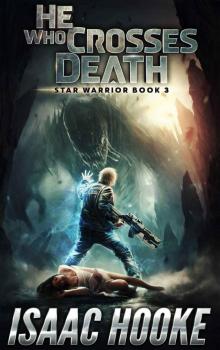 He Who Crosses Death (Star Warrior Quadrilogy Book 3)
He Who Crosses Death (Star Warrior Quadrilogy Book 3)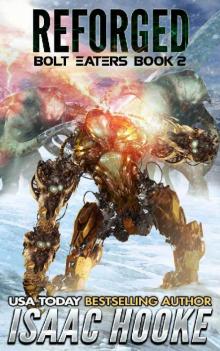 Reforged (Bolt Eaters Trilogy Book 2)
Reforged (Bolt Eaters Trilogy Book 2) Refurbished
Refurbished Reloaded (AI Reborn Trilogy Book 2)
Reloaded (AI Reborn Trilogy Book 2)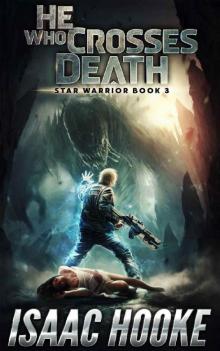 He Who Crosses Death
He Who Crosses Death Explorations: First Contact
Explorations: First Contact Planet Killer (A Captain's Crucible Book 4)
Planet Killer (A Captain's Crucible Book 4)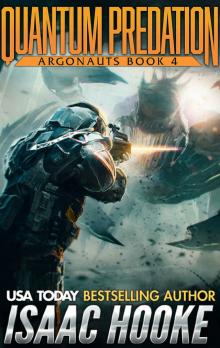 Quantum Predation (Argonauts Book 4)
Quantum Predation (Argonauts Book 4)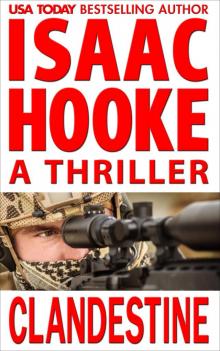 Clandestine-IsaacHooke-FreeFollowup
Clandestine-IsaacHooke-FreeFollowup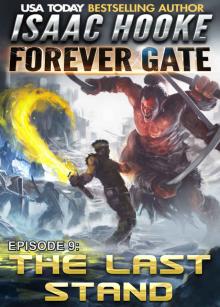 The Last Stand (The Forever Gate Book 9)
The Last Stand (The Forever Gate Book 9)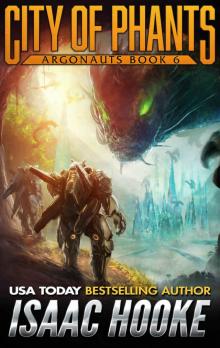 City of Phants (Argonauts Book 6)
City of Phants (Argonauts Book 6) Test of Mettle (A Captain's Crucible Book 2)
Test of Mettle (A Captain's Crucible Book 2)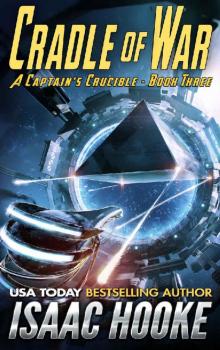 Cradle of War (A Captain's Crucible Book 3)
Cradle of War (A Captain's Crucible Book 3)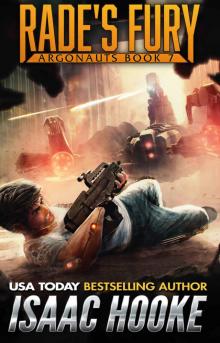 Rade's Fury (Argonauts Book 7)
Rade's Fury (Argonauts Book 7) Rebirth (The Forever Gate Book 6)
Rebirth (The Forever Gate Book 6) The Forever Gate Compendium Edition
The Forever Gate Compendium Edition Mechs vs. Dinosaurs (Argonauts Book 8)
Mechs vs. Dinosaurs (Argonauts Book 8)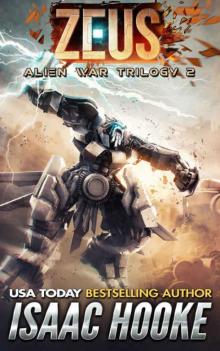 Alien War Trilogy 2: Zeus
Alien War Trilogy 2: Zeus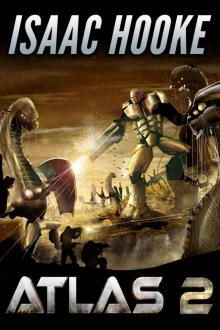 ATLAS 2 (ATLAS Series Book 2)
ATLAS 2 (ATLAS Series Book 2)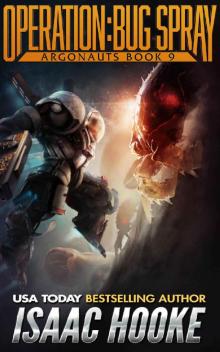 Operation_Bug Spray
Operation_Bug Spray